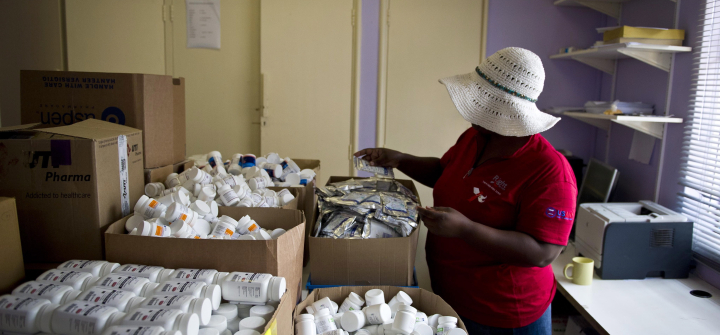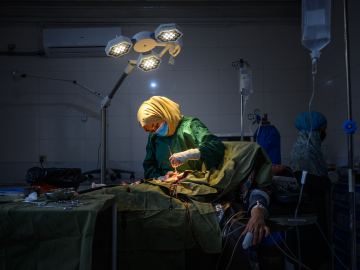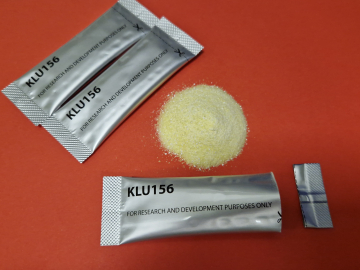Those Left Behind as PEPFAR Retreats
Thando* is 11 years old. She lives in Giyani in South Africa where dust drifts through the streets and bright laundry hangs from corrugated tin roofs. Her mother died of AIDS when Thando was a toddler. Now, her grandmother—who sells tomatoes by the roadside—walks with her each month to collect the pills that keep her alive.
But in March, the clinic had no HIV medication. No one explained why.
Thando doesn’t know that, halfway around the world in the U.S. Congress, a once-unshakable promise is faltering. She doesn’t know that some American lawmakers have refused to reauthorize the program that supports her care: PEPFAR, the President’s Emergency Plan for AIDS Relief.
Since 2003, PEPFAR has saved over 26 million lives. It helped build health systems in 50+ countries, hiring nurses, strengthening supply chains, training local staff, and establishing infrastructure that now delivers far more than HIV care. In South Africa—once the global epicenter of the epidemic—PEPFAR was foundational in the early response.
South Africa has long been preparing to completely transition away from PEPFAR support. It developed a clear plan to bring the epidemic under control as a public health threat by 2030, aligned with global targets and backed by strong domestic commitment. As a result, PEPFAR today does not purchase antiretroviral therapy or HIV pre-exposure prophylaxis for the country.
What remains of U.S. funding—now just 21% of the South African national HIV program—is not about life support. It’s about logistics, systems, and community programs that make the national response effective, equitable, and human-centered.
The sudden and abrupt disappearance of this funding on January 20, 2025, jeopardizes that plan. It risks not only stalling progress, but reversing it, undermining years of shared investment, and extending the global threat of HIV.
And it’s not just about South Africa. In places like Malawi, the Congo, and Haiti—where U.S. aid makes up the majority of national health budgets—governments are now being forced to make impossible choices: Keep people with HIV alive or buy vaccines for newborns.
There is no “efficiency” in this kind of scarcity. Only tragedy.
Some U.S. policymakers have raised fair concerns about long-term dependency. But PEPFAR has always been about building sustainable systems, not creating permanent reliance. What’s at stake now is not whether others should take responsibility—they already are—but whether the U.S. should abandon its leadership at the very moment global control of HIV is within reach.
To pull out now, so brusquely, is not only morally troubling—it is a strategic mistake on a global scale.
PEPFAR didn’t just deliver pills. It funded peer networks, girls’ clubs, and safe clinics for adolescent girls—who still account for 62% of all new HIV infections among youth in Africa. When funding disappears, these protective webs vanish first, long before drugs run out.
Young women lose access to prevention. Survivors of sexual violence lose access to post-exposure prophylaxis. Teen mothers lose the support that helped them stay in school, get tested, and stay alive.
And beyond the clinics, there is a deeper loss: America’s global reputation as a force for good. PEPFAR was bipartisan from the beginning—launched by President George W. Bush, expanded under President Obama, and sustained by every administration since. It showed that U.S. leadership could be bold, moral, and effective. To retreat now is to signal that this era of principled global engagement is over.
Thando is not a U.S. citizen. But her life, and the future of millions like her, still hangs in the balance.
Congress must act and reauthorize PEPFAR. Philanthropists, faith leaders, and everyday citizens must raise their voices. If anything defines the soul of a nation, it is how it treats the powerless.
As Martin Luther King Jr. said: “The arc of the moral universe bends towards justice; but only if we bend it.”
We can still choose to do the right thing. But only if we choose to act—now.
*The authors are not using Thando’s real name or township to preserve her privacy.
Joseph Tucker, MD, PhD, is a professor and infectious diseases physician at the University of North Carolina at Chapel Hill and a professor of Global Health at the London School of Hygiene and Tropical Medicine.
Molly McNairy, MD, MSc, is an associate professor of Medicine and an emerging leader in Health and Medicine at the National Academy of Medicine.
Linda-Gail Bekker, MBChB, PhD, DCH, is a professor and director of the Desmond Tutu Centre at the University of Cape Town and past president of the International AIDS Society.
Join the 50,000+ subscribers in 170+ countries who rely on Global Health NOW summaries and exclusive articles for the latest public health news. Sign up for our free weekday newsletter, and please share the link with friends and colleagues.
A health worker manages supplies in a PEPFAR-funded AIDS clinic in Johannesburg, South Africa, on January 27, 2012. Foto24/Gallo Images/Getty Images




